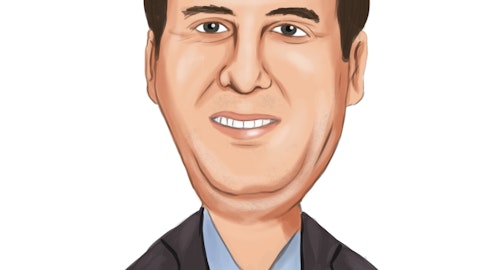Edward Codispoti : Yes. I mean, as I mentioned earlier, our leverage right now is 1.4 times, which is relatively low versus some of our competitors. And so we feel very comfortable with that. As we add acquisitions to the balance sheet some — two things. First of all, some of those purchases may be funded through our cash from operations. And then just going forward any excess cash that we’ve got coming in through our cash flows we would try to pay down as much of that leverage as possible.
David Marsh: Yes. I just noticed obviously a pretty sizable bump up sequential in interest expense. And so I’m sure that just in the current rate environment there would probably be some desire to till that down a little bit and get that back down to a lower number.
Edward Codispoti: And by the way we did pay down during the quarter. I mean, if you don’t consider the acquisitions we actually paid down around $13 million or so, so far during this first half of the year. So we have been on that track of paying down the debt. And then when an acquisition comes along, we — if there’s a need to fund some of that through the facility then we add to that as needed. But our focus is on good acquisitions in terms of return on capital, while at the same time deleveraging as much as possible throughout that period.
David Marsh: All right. Thanks guys. Well, good luck for the second half and I appreciate you taking the questions.
Edward Codispoti: Thank you.
Operator: Next question comes from Rob Brown, Lake Street Capital Markets. Rob, please go ahead.
Rob Brown : Good afternoon Dickerson.
Dickerson Wright : Hi.
Rob Brown : I just wanted to follow back up on the real estate transaction business. You had some pretty good stabilization in the quarter. How is that looking the back half of the year? And I guess what’s sort of some of the dynamics there that’s allowing it to stabilize?
Dickerson Wright : Well, it improved in this last reporting quarter, we’re seeing some buildup in their backlog. And where we’ve seen some improvement it’s more in the government areas that’s where we have two groups in our transactional real estate. One of them is primarily works with Fannie Mae and Ginnie Mac. And so we’ve seen some improvement in that area. And overall we’re just — we’re starting to see improvement. They continue to remain profitable. They’re certainly under where they were last year by about $15 million but we’re starting to see some improvement. In revenue $15 million in revenue.
Rob Brown: Yes. Okay. Okay. Great. And then on the Red acquisition it seems like a good fit in the building area the how does that sort of fit in in terms of cross-selling and in I guess synergies in the building area just elaborate on how that fits with what you’ve been doing.
Dickerson Wright : Well, the cross-selling from any of our international operations has really been an offshoring work that they do work for our offices in the U.S. So we would hope that some of our increased capability with Red will improve on the cross-selling and offshoring work that they can be doing for our operations in the states.
Rob Brown: Okay. Great. Thank you and congrats on a nice quarter.
Dickerson Wright: Thank you.
Operator: Your next question comes from Jeff Martin from ROTH MKM. Jeff, go ahead.
Jeff Martin: Thanks. good afternoon, everyone. Dick, I apologize if some of these questions are ever done and I hopped on the call a bit late. What is the — what was the impact from the LNG business? It sounds like it was more of a timing issue than end of project situation? What — if you already covered that, if you could repeat it that would be helpful. If not then, look forward to hearing more about it.



